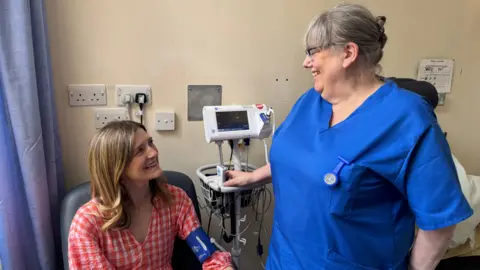Mother treated with game-changing diabetes drug
 BBC
BBCA Devon woman is one of the first adults in the UK to trial what medics call a groundbreaking drug for type 1 diabetes.
The new drug, Teplizumab, works by reprogramming the immune system to stop it mistakenly attacking pancreatic cells which produce insulin.
It is said to delay the need for insulin by up to three years, but must be given at the earliest stage of the disease to be effective.
Hannah Robinson, 36, from Exeter, who is taking the drug after discovering during pregnancy she was in the early stages of developing type 1 diabetes, said she felt "very privileged" to be part of the trial.
About 4.6m people in the UK have diabetes, with more than 270,000 living with type 1, according to the NHS.
There is currently no cure and most need daily insulin to manage blood sugar levels and reduce the risk of complications.
Targets underlying problem
Some children are also being treated with the drug across the UK.
In type 1 diabetes, the immune system attacks beta cells in the pancreas, hindering their ability to produce insulin, which regulates blood sugar levels.
Teplizumab trains the immune system to stop attacking these cells, delaying the need for insulin by up to three years, according to medics.
Dr Nick Thomas, the diabetes consultant treating Ms Robinson at the Royal Devon and Exeter Hospital (RD&E), said Teplizumab was the first therapy "which actually targets the underlying problem".
However, it must be given at the earliest stage of the disease to be effective.
Experts at the RD&E and the University of Exeter are leading research that includes using genetics combined with autoantibody testing to spot individuals at high risk of developing type 1 diabetes.
This means they can be monitored and potentially offered the drug if eligible, transforming the way type 1 diabetes is managed, they said.
Prof Richard Oram, from the University of Exeter and consultant physician at the RD&E, said the trial of the new drug was "extremely exciting and motivating".
"Here in Exeter, we are undertaking cutting-edge clinical research to help us find more people at risk and discover how we can prevent them from developing type 1 diabetes," he said.
Teplizumab is approved in the United States and is currently under review by the UK's National Institute for Health and Care Excellence.
The drug is not yet routinely available in the UK and the team at the Royal Devon University Healthcare NHS Foundation Trust was granted special permission to treat Ms Robinson with the new medication.
The mother-of-two said it would be incredible to find a cure for type 1 diabetes.
Follow BBC Devon on X, Facebook and Instagram. Send your story ideas to [email protected].
